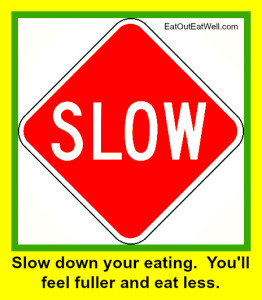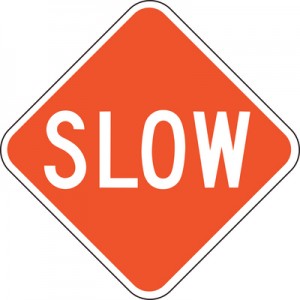 Do you wolf your food down so quickly that it’s gone before you realize you’ve eaten it all – and you’re left still hungry and staring at an empty plate?
Do you wolf your food down so quickly that it’s gone before you realize you’ve eaten it all – and you’re left still hungry and staring at an empty plate?
Slow down when you eat!
People who eat quickly eat more calories than they would if they ate a bit more slowly. People who eat more slowly also feel fuller.
Why Does Slow Eating Make A Difference?
A recent study showed that hormones that give you feelings of fullness, or satiety, are more pronounced when people eat slowly. Subjects given identical servings of ice cream released more of these hormones when they ate it in 30 minutes instead of 5 minutes.
It leads to eating less, too. People who ate at a slow pace compared to when they chowed down very quickly said they were fuller and ending up eating about 10 percent fewer calories.
Twenty Minutes Or Less
Americans start and finish their meals — and clear the table — in less than 20 minutes. A study published in the journal Appetite, found that people eating lunch by themselves in a fast food restaurant finish in 11 minutes. They finish in13 minutes in a workplace cafeteria and in 28 minutes at a moderately priced restaurant. Eating with three other people takes about twice as long – which can still end up being a really short chunk of time.
Once again, Moms around the world are right – slow down when you eat. (Doesn’t that often go with don’t grab?) Slowing down allows you and your brain to register a feeling of fullness and may even mean that you eat fewer calories. You might even have time to really taste and enjoy your food, too.
This is the last week of the lose 5 pounds in 5 weeks challenge. How are you doing? Let us know on Facebook — and give Eat Out Eat Well a “like” while you’re there.


